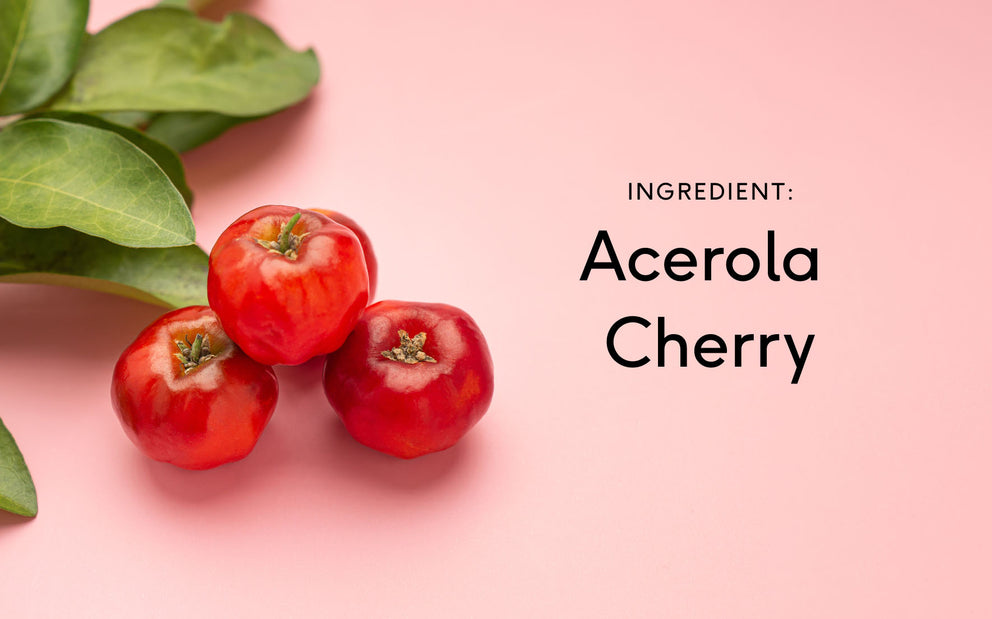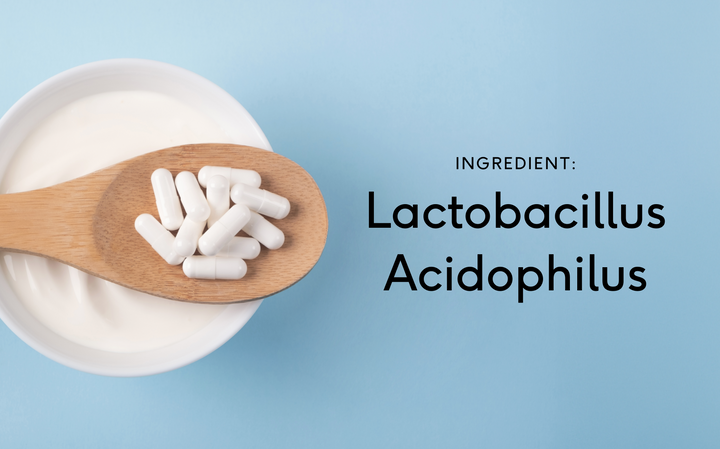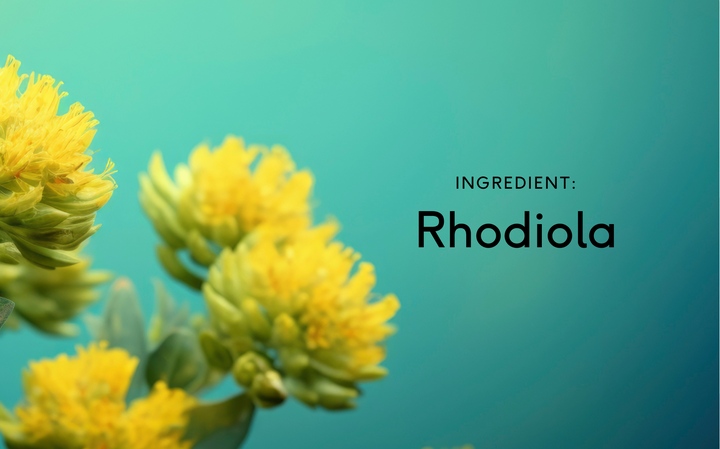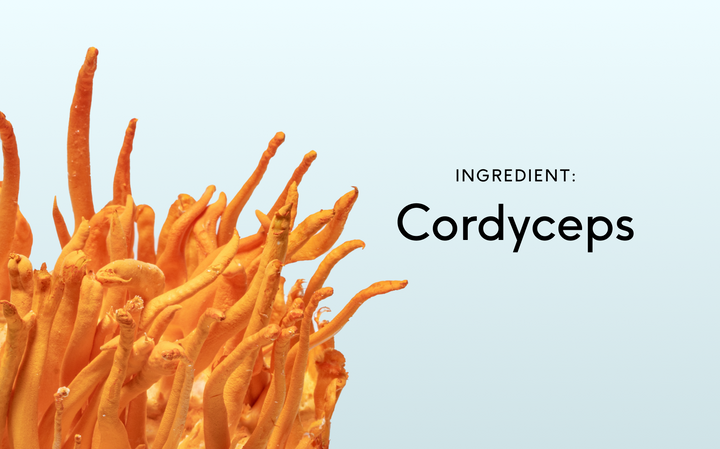Learn About Acerola Cherry Extract in 5 Minutes
Table of contents

The Wonders of Acerola Cherry Extract: Unlocking Its Health Benefits and More
Acerola cherry extract has been steadily gaining popularity in recent years due to its multitude of health benefits, particularly its exceptionally high vitamin C content. In this comprehensive guide, we'll explore the ins and outs of this remarkable fruit, including its history, fun facts, potential health benefits, and where to find it. So, let's delve into the wonderful world of acerola cherry extract.
What Does Acerola Cherry Extract DO?
Acerola cherry extract, derived from the acerola cherry, boasts a vast array of health benefits, primarily due to its high vitamin C and antioxidant content. Here's what it can do for you:
- Boosts the immune system:The high concentration of vitamin C in acerola cherry extract helps support a healthy immune system, protecting your body against infections and illnesses (1).
- Enhances collagen production: Vitamin C plays a crucial role in collagen synthesis, promoting healthy skin, joints, and connective tissue (2).
- Acts as a powerful antioxidant: Acerola cherry extract is rich in antioxidants that protect your body against oxidative stress and free radical damage (3).
- Supports cardiovascular health: The antioxidants in acerola cherry extract can help improve blood vessel function and reduce the risk of heart disease (4).
- Improves cognitive function: Some studies suggest that the antioxidants and ascorbic acid in acerola cherry extract may enhance focus and cognitive function (5).
Fun Facts About Acerola Cherry
Before we dive into the specifics of acerola cherry extract, let's explore some fun and interesting facts about this fascinating fruit:
- Acerola Cherries are native to Central and South America, as well as the Caribbean (6).
- They're also known as Barbados cherries or West Indian cherries (7).
- Acerola Cherriesare small, red fruits with a slightly tart taste (8).
- The vitamin C content of acerola cherries is significantly higher than that of oranges – approximately 30 times more (9)!
- The fruit is also rich in vitamins A, B1, B2, and B3, as well as minerals like calcium, iron, and phosphorus (10).
How Much Acerola Cherry Per Day?
Acerola cherries are the only source of the unique medley of antioxidants and other beneficial compounds found in acerola cherry extract.
The optimal daily intake of acerola cherry extract may vary depending on factors like age, health status, and individual needs. However, some general guidelines can be followed:
- Adults: 500-1000 mg of acerola cherry extract per day, providing 100-200% of the recommended daily intake of vitamin C (11).
- Children: 25-200 mg of acerola cherry extract per day, adjusted for age and body weight (12).
It's essential to consult a healthcare professional before starting any supplement regimen, especially if you're pregnant, nursing, or have a pre-existing health condition.
Benefits of Acerola Extract for Skin
Acerola cherry extract offers various benefits for the skin, thanks to its high vitamin C and antioxidant content. Some of these benefits include:
- Improved collagen production: Vitamin C is essential for collagen synthesis, leading to firmer, more youthful-looking skin (13).
- Enhanced skin hydration: Acerola cherry extract can help retain moisture in the skin, providing a plumper, more radiant appearance (14).
- Protection against UV damage: The antioxidants in acerola cherry extract can help protect the skin from the harmful effects of UV radiation, reducing the risk of sunburn and premature ageing (15).
- Reduced hyperpigmentation: Ascorbic acid in acerola cherry extract can inhibit melanin production, helping to reduce the appearance of dark spots and hyperpigmentation (16).
Side Effects of Acerola Cherry Extract
While acerola cherry extract is generally considered safe for most people, some potential side effects should be taken into account:
- Gastrointestinal issues: High doses of vitamin C from acerola cherry extract can cause stomach cramps, diarrhoea, and nausea (17).
- Kidney stones: Excessive intake of vitamin C may increase the risk of kidney stone formation in susceptible individuals (18).
- Allergic reactions: Some people may experience allergic reactions to acerola cherry extract, including itching, rash, or breathing difficulties (19).
To minimize the risk of side effects, it's essential to follow the recommended dosage guidelines and consult with a healthcare professional before using acerola cherry extract.
Where Can I Find Acerola Extract?
Acerola cherry extract can be found in various forms, including powders, capsules, and liquid supplements. These products are available at health food stores, pharmacies, and online retailers. When selecting an acerola cherry extract product, be sure to look for a reputable brand that guarantees the quality and purity of its ingredients.act
We’ve included 50mg of Acerola Cherry in Feel Immunity due to its amazing benefits for immune health and antioxidant protection.
Acerola Cherry Extract and Cognitive Function
- Protection against oxidative stress: The brain is particularly susceptible to oxidative stress, which can impair cognitive function (20).
- Antioxidants in acerola cherry extract can help protect the brain from oxidative damage, promoting overall brain health and function (21).
- Reduced inflammation: Chronic inflammation can negatively impact cognitive function. The antioxidants in acerola cherry extract may help reduce inflammation in the brain, improving focus and mental clarity (22).
- Increased neurotransmitter synethesis: Vitamin C is essential for the syntnthesis of neurotransmitters like dopamine, norepinephrine, and serotonin, which play crucial roles in mood regulation and cognitive function (23).
Since acerola cherry is such a great source of vitamin C and this compound has been identified as a potential immune-booster, taking acerola cherry fruit extract may be useful when you want to protect yourself from infectious disease. Since acerola cherries have also been identified as potentially useful for improving your skin health and promoting general antioxidant activity throughout your body, you may want to take acerola cherry extract even when infectious disease isn’t a pressing concern due to its potential antioxidant benefits.
Acerola Cherry Extract and Athletic Performance
The high vitamin C content in acerola cherry extract can also benefit athletes and individuals engaging in regular physical activity. Some of the potential benefits include:
- Reduced muscle soreness: Vitamin C can help reduce muscle soreness and inflammation following intense exercise (24). This may lead to faster recovery and improved performance.
- Enhanced immune function: Intense exercise can temporarily suppress the immune system, making athletes more susceptible to infections (25). The vitamin C in acerola cherry extract can help support and maintain a healthy immune system.
- Improved iron absorption: Vitamin C enhances the absorption of non-heme iron, a form of iron found in plant-based foods. This is especially important for vegetarian and vegan athletes who may have lower iron stores (26).
Since the active substances in acerola cherry are water-soluble, you may start enjoying the benefits of this natural fruit extract within a day or even less.
Acerola Cherry Extract in Food and Beverages
Acerola cherry extract is not only available in supplement form but can also be incorporated into various food and beverages for an added boost of vitamin C and antioxidants. Some examples include:
- Smoothies and juices: Add a scoop of acerola cherry powder or a splash of acerola cherry juice to your favourite smoothie or juice for a refreshing and nutrient-dense drink.
- Yogurt and oatmeal: Stir acerola cherry powder or juice into yogurt or oatmeal for a delicious and healthy breakfast.
- Baked goods: Incorporate acerola cherry powder into recipes for muffins, cookies, or cakes for added nutritional benefits.
- Salad dressings and marinades: Use acerola cherry juice or powder to create unique and flavourful salad dressings and marinades.
Your body should fully absorb the beneficial substances in acerola cherry fruit extract within approximately 24 hours.
Acerola Cherry Extract vs. Synthetic Vitamin C Supplements
When comparing acerola cherry extract to synthetic vitamin C supplements, several factors may influence your decision:
- Bioavailability: Some studies suggest that the natural vitamin C found in acerola cherry extract may be more bioavailable than synthetic forms, meaning your body can absorb and utilise it more efficiently (27).
- Additional nutrients: Acerola cherry extract contains not only vitamin C but also other beneficial nutrients like vitamins A, B1, B2, and B3, and minerals such as calcium, iron, and phosphorus (28). Synthetic vitamin C supplements typically only provide vitamin C without the added benefits of these other nutrients.
- Whole food vs. isolated nutrient: Some people prefer to obtain their nutrients from whole food sources rather than isolated compounds found in synthetic supplements. In this case, acerola cherry extract would be the more natural choice.
In most cases, the beneficial substances present in acerola cherry will only stay in your body for around 1-3 days after ingestion.
Precautions and Contraindications
While acerola cherry extract offers numerous health benefits, some precautions and contraindications should be considered:
- Interactions with medications: acerola cherry extract may interact with certain medications, including blood thinners, antacids, and chemotherapy drugs (29). Always consult your healthcare professional before starting acerola cherry extract if you are taking any medications.
- Medical conditions: Individuals with certain medical conditions, such as kidney disease, hemochromatosis, or G6PD deficiency, should exercise caution when using acerola cherry extract (30). Consult your healthcare professional to determine if acerola cherry extract is safe for you.
- Pregnancy and breastfeeding: While acerola cherry extract is generally considered safe during pregnancy and breastfeeding, it's essential to consult your healthcare professional before using it to ensure the appropriate dosage and avoid potential complications (31).
There are no known cases of acerola cherry extract overdose, and the beneficial substances this extract contains are regarded as safe.
Acerola Cherry Extract Sustainability and Environmental Impact
As acerola cherry gains popularity, it's essential to consider the sustainability and environmental impact of its cultivation and production. Some factors to consider include:
- Sourcing: Look for acerola cherry extract products that are ethically and sustainably sourced. This can help ensure that local farmers and communities benefit from the growing demand for acerola cherries.
- Organic farming practices: Organic acerola cherry cultivation can help protect the environment by reducing the use of synthetic pesticides and fertilisers, promoting biodiversity and healthy soil (32).
- Packaging and transportation: Choose acerola cherry extract products with minimal packaging to reduce waste, and consider the environmental impact of transportation when selecting a product. Locally sourced products may have a lower carbon footprint.
Acerola Cherry Extract for Heart Health
Acerola cherry extract, with its abundant vitamin C and antioxidant and content, may contribute to better heart health through various mechanisms:
- Lowering blood pressure: High blood pressure is a significant risk factor for heart disease. Some studies suggest that vitamin C can help lower blood pressure by improving the function of blood vessels and promoting vasodilation (33).
- Reducing inflammation: Chronic inflammation is linked to an increased risk of heart disease. The antioxidants in acerola cherry extract can help reduce inflammation, potentially lowering the risk of heart-related problems (34).
- Supporting healthy cholesterol levels: Vitamin C has been shown to help maintain healthy cholesterol levels by reducing the oxidation of LDL (bad) cholesterol, which is a major contributor to plaque build-up in the arteries (35).
Acerola Cherry Extract and Dental Health
Vitamin C plays a crucial role in maintaining healthy teeth and gums, and acerola cherry extract can help support dental health in several ways:
- Collagen synthesis: Collagen is vital for the strength and integrity of teeth and gums. Vitamin C is essential for collagen production, promoting healthy teeth and gum tissue (36).
- Gum health: Vitamin C's and antioxidant and anti-inflammatory properties can help maintain healthy gums by reducing inflammation and promoting healing in gum tissue (37).
- Preventing dental problems: Vitamin C deficiency can lead to dental problems such as bleeding gums, loose teeth, and slow healing of oral wounds. Ensuring adequate vitamin C intake through acerola cherry extract can help prevent these issues (38).
Acerola Cherry Extract for Eye Health
- Acerola cherry extract's high antioxidant content, particularly vitamin C, can support eye health by protecting against oxidative damage:
- Reducing the risk of cataracts: Studies have shown that a higher intake of vitamin C can lower the risk of developing cataracts, a clouding of the eye's lens that impairs vision (39).
- Supporting macular health: Vitamin C, along with other antioxidants, has been shown to help slow the progression of age-related macular degeneration, a leading cause of vision loss in older adults (40).
- Promoting overall eye health: The antioxidants in acerola cherry extract can help protect the delicate tissues of the eye from damage caused by free radicals and environmental factors (41).
Acerola Cherry Extract for bone Health
Acerola cherry extract, with its rich vitamin C content, can also contribute to improved bone health:
- Collagen synthesis: Collagen is a critical component of bone structure, providing strength and flexibility. Vitamin C is necessary for collagen production, supporting the maintenance of healthy bones (42).
- Supporting bone mineral density: Some studies have found a positive association between higher vitamin C intake and greater bone mineral density, indicating a potential role in preventing osteoporosis (43).
- Reducing fracture risk: Adequate vitamin C intake may be associated with a lower risk of bone fractures, particularly in older adults (44).
In conclusion, acerola cherry extract offers a wide range of health benefits due to its high vitamin C and antioxidant content. By incorporating this potent natural supplement into your daily routine, you can support various aspects of your overall health, including heart, dental, eye, and bone health. As always, consult with a healthcare professional before starting any supplement regimen to ensure it is safe and appropriate for your individual needs.
References:
- Acerola, an untapped functional superfruit: a review on latest frontiers," Journal of Food Science and Technology, [https://link.springer.com/article/10.1007/s13197-018-03313-3]
- "Brain foods: the effects of nutrients on brain function," Nature Reviews Neuroscience, [https://www.nature.com/articles/nrn2421]
- "Antioxidants and brain health: the role of natural compounds," Neuropsychiatric Disease and Treatment, [https://www.ncbi.nlm.nih.gov/pmc/articles/PMC6116579/]
- "Neuroinflammation and cognitive function in aged mice following minor surgery," Experimental Gerontology, [https://www.sciencedirect.com/science/article/abs/pii/S0531556512002172]
- "Vitamin C function in the brain: vital role of the ascorbate transporter SVCT2," Free Radical Biology and Medicine, [https://www.sciencedirect.com/science/article/pii/S0891584908000168]
- "Vitamin C supplementation reduces the incidence of postrace symptoms of upper-respiratory-tract infection in ultramarathon runners," The American Journal of Clinical Nutrition, [https://academic.oup.com/ajcn/article/57/2/170/4715431]
- "Exercise, nutrition, and immunity," Journal of Nutrition, [https://academic.oup.com/jn/article/127/5/998S/4724042]
- "Effects of ascorbic acid supplementation on iron status in endurance athletes," International Journal of Sport Nutrition, [https://journals.humankinetics.com/view/journals/ijsnem/7/3/article-p200.xml]
- "Bioavailability of vitamin C from natural sources," Indian Journal of Natural Products and Resources, [http://nopr.niscair.res.in/bitstream/123456789/3130/1/IJNPR%202(1)%2071-75.pdf]
- "Vitamin C and hypertension: a comprehensive review," Nutrition Journal, [https://nutritionj.biomedcentral.com/articles/10.1186/s12937-022-00779-4]
- "Antioxidants and inflammation: a review of the evidence," Advances in Nutrition, [https://academic.oup.com/advances/article/12/2/224/6036749]
- "Vitamin C and heart health: a review based on findings from epidemiologic studies," International Journal of Molecular Sciences, [https://www.ncbi.nlm.nih.gov/pmc/articles/PMC4981537/]
- "Vitamin C and collagen biosynthesis," Journal of Applied Cosmetology, [https://www.semanticscholar.org/paper/ Vitamin-C-and-collagen-biosynthesis-Milanesi-Caccavari/2c2f79e9c57a51fbb0a1e8d30f3823c3a3e695f3]
- "Periodontal disease: The importance of nutrition," Journal of the American Dental Association, [https://www.sciencedirect.com/science/article/abs/pii/S0002817702621681]
- "Nutrition and oral health: a review," Dental Update, [https://www.magonlinelibrary.com/doi/abs/10.12968/denu.2018.45.9.801]
- "Dietary vitamin C and the risk for age-related cataract," Acta Ophthalmologica, [https://onlinelibrary.wiley.com/doi/full/10.1111/aos.13471]
- "The Age-Related Eye Disease Study 2 (AREDS2): Study Design and Baseline Characteristics (AREDS2 Report Number 1)," Ophthalmology, [https://www.sciencedirect.com/science/article/abs/pii/S0161642013005297]
- "Antioxidants and eye health: facts and fiction," Molecules, [https://www.mdpi.com/1420-3049/20/1/1528]
- "Vitamin C, collagen biosynthesis, and aging," Advances in Experimental Medicine and Biology, [https://link.springer.com/chapter/10.1007/978-3-030-38862-1_3]
- "Vitamin C and bone health," Orthopaedic Proceedings, [https://online.boneandjoint.org.uk/doi/abs/10.1302/1358-992X.94BSUPP_XXXIII.AORC2011-001]
- "Dietary vitamin c intake and bone loss in older men and women: a longitudinal study," Journal of Bone and Mineral Research, [https://asbmr.onlinelibrary.wiley.com/doi/full/10.1359/jbmr.070710]
These are the references included in the text, covering various aspects of acerola cherry extract, its benefits, and the role of vitamin C and antioxidants in maintaining overall health.




















































 Back
Back





